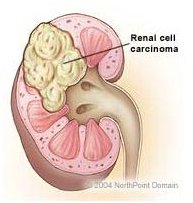Knowing the Early Symptoms of Kidney Cancer
Kidney Cancer
The kidney’s main function in the body is to produce urine by ridding the body of excess water and waste. Kidney cancer occurs when a mass or tumor appears in the kidneys. Kidney cancer usually affects people over 40. Kidney cancer can be caused by genetics, obesity, high blood pressure or smoking. It occurs more frequently in men than women. The most common form of kidney cancer is renal cell carcinoma.
Sadly, many times symptoms do not appear until the cancer has spread or grown in size. Knowing the early symptoms of kidney cancer is important. The patient knows their body best and is the best person to know when there are changes or abnormalities. As with most cancers early detection and treatment is key in increasing the survival rate of the patient. Statistics show a 90 percent survival rate to the first five year mark in patient’s who were diagnosed when the tumor was still localized in the kidney.
Signs and Symptoms
There are many signs and symptoms of kidney cancer but most of them may not appear in the early stages. It is important that any persistent sign or symptom that occurs is not ignored by the patient but reported immediately to their physician. A single sign or symptom may occur or many may occur such as these:
1. Persistent reoccurring kidney infections.
2. Unexplained weight loss.
3. Decreased appetite.
4. Hematuria (blood in the urine). This condition usually gives the urine a pinkish or orangish color. This is the easiest symptom to detect because you can see it.
5. Decreased urination.
6. Persistent back pain in the lower back region or just below the ribs.
7. Lumps forming in the side of the abdomen. The lumps usually form in the lower abdomen but may appear in other places as well. If any abnormal lump is felt a visit to the physician is in order.
8. Anemia. This occurs when a patient’s red blood cell count is low.
9. Persistent fever. Any fever that lasts longer than a few days without an infection present warrants a visit to the physician.
What to Do
The patient knows their body best. If any of the above symptoms occur, the patient should seek a diagnosis from their physician. Symptoms sometimes only appear after the tumor has grown so early detection is key. The symptoms may turn out to be something different than kidney cancer but any disease needs treatment quickly. If the signs and symptoms indicate kidney cancer the sooner it is diagnosed the sooner treatment can begin. Early detection and early treatment increases survival rates and quality of life for the patient.
References
Kidney Problem: https://www.kidney-problem.org/kidney-cancer-survival-rate.html
Web MD: https://www.webmd.com/cancer/understanding-kidney-cancer
Image source: www.publicdomainpictures.net
